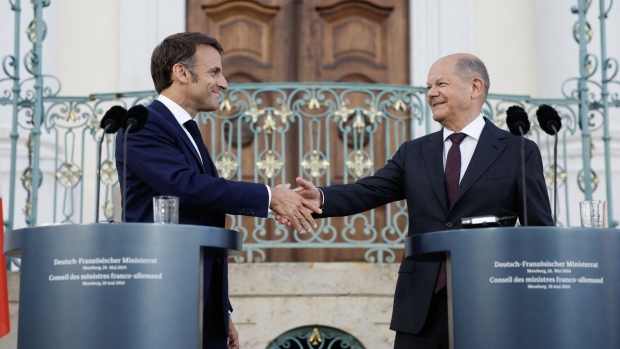May 28, 2024
Macron, Scholz Pledge to Turn Capital Markets Talk Into Reality
, Bloomberg News

(Bloomberg) -- Germany and France have agreed to make rapid progress to deepen the European Union’s capital markets to boost investment in the bloc after years of discussions, French President Emmanuel Macron said.
Speaking alongside German Chancellor Olaf Scholz at a joint news conference, Macron said the EU’s two powerhouse economies will back the creation of a common savings product for the bloc to help finance long-term priorities such as the green transition, AI, innovation and defense.
The two leaders want the European Commission, the EU’s executive arm, to come up with “operational proposals” for securitization in the coming months, he said. They’ve also asked their finance ministers to pursue common supervision and harmonization of insolvency rules.
“The convergence between the two of us is unprecedented,” Macron said at Schloss Meseberg, north of Berlin, at the end of a three-day state visit to Germany. “I’m sure it will now lead to strong, accelerated action at the heart of Europe.”
Read More: EU Nears Deal on Failed Lenders in Path to Closer Banking Ties
The EU has made little progress on its plan to create a single market for capital since it was launched close to a decade ago. With the bloc facing growing competition from the US and China, and massive financing needs for defense and the climate and digital transitions, officials argue progress is needed to enable companies to access funds for growth and Europeans to invest savings within the EU.
European Central Bank President Christine Lagarde has added to the sense of urgency, saying this would be the best way to prepare the EU for the potential economic disruption should Donald Trump return to the White House.
Scholz and Macron, whose sometimes difficult relationship and lack of chemistry are in the spotlight, face pressure to show the Franco-German engine can drive progress on issues such as joint defense, aid to Ukraine and how to meet the EU’s funding needs.
“We want — indeed, we must — secure Europe’s competitiveness, and that requires investment, especially private investment,” the German chancellor said. “Too many companies are turning to the other side of the Atlantic to finance growth.”
He added: “We both agree, we finally need an integrated European financial market. And that includes a European capital markets union.”
A French study published last month led by Christian Noyer, the former head of France’s central bank, said the EU has suffered from chronic underinvestment in physical capital and innovation since the global financial crisis and now faces additional funding requirements approaching €1 trillion ($1.1 trillion) a year by 2030.
©2024 Bloomberg L.P.





